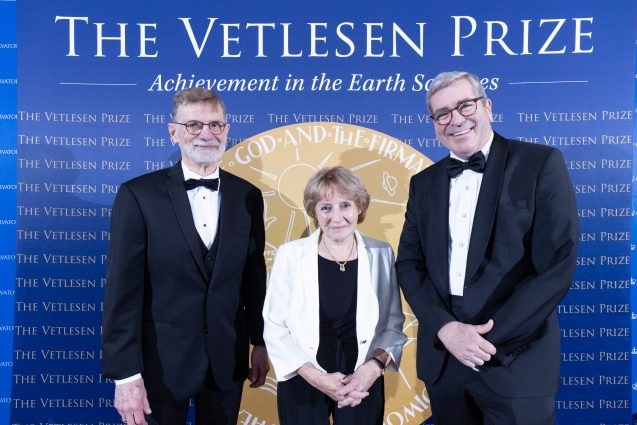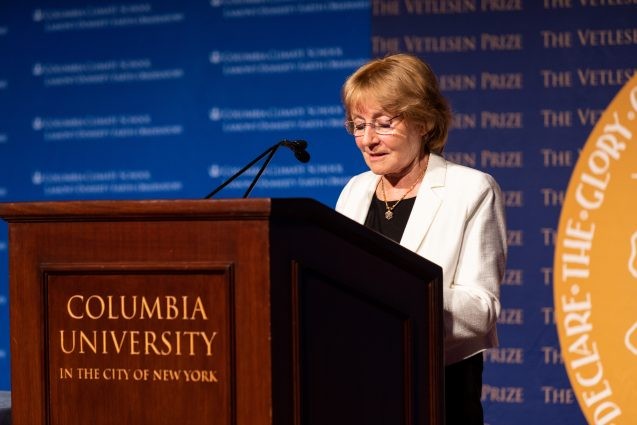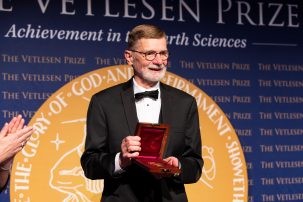Vetlesen Prize Ceremony Honors Two Distinguished Researchers in Earth Sciences
A celebration held at Columbia University recognized scientists Anny Cazenave and David Kohlstedt as the 2020 and 2023 Vetlesen Prize recipients.
This year, not one but two researchers were celebrated for their pioneering scientific achievements at a ceremony for the prestigious Vetlesen Prize held April 26 at Columbia University’s Low Library Rotunda. The event was introduced by Maurizio Morello, executive vice president of the G. Unger Vetlesen Foundation, which created the prize, and emceed by Miles O’Brien, national correspondent for PBS NewsHour and the reporter, producer, and director behind the new film, Chasing Carbon Zero.

Established in 1959, the Vetlesen Prize is one of the highest honors in the earth sciences. At this year’s celebration, it was presented to Anny Cazenave and David Kohlstedt “for scientific achievement resulting in a clearer understanding of the Earth, its history, or its relations to the universe.” (Cazenave was the 2020 Vetlesen Prize recipient, but her ceremony was postponed until now due to COVID-19.) The researchers each received a gold medal and a $250,000 award to commemorate their accomplishments over the past several decades and were met with ample applause from the sharply dressed audience.
Earlier that day at the Columbia Climate School’s Lamont-Doherty Earth Observatory, which administers the Vetlesen Prize, the two awardees gave lectures on their research journeys and the scientific questions that have propelled them forward in their careers. Cazenave gave a talk titled, “Present-day Sea Level Rise: The Role of Space Observations,” and Kohlstedt presented, “Living with Pressure: Adventures with Olivine & Beyond.”
Cazenave introduced the audience to one of the central questions in her current research: “How much will sea level rise, globally and regionally, over the next decades and beyond in response to ice sheet mass loss and ocean warming?” She detailed the first time satellite altimetry was discussed in relation to oceanic measurements in a workshop by NASA back in 1969, and cataloged how much progress has been made in the field and in the accuracy of space observations in the years since. The new challenge, Cazenave told the room, will be measuring sea level rise at the coastlines around the world, which can have the largest societal implications and where there are still many unknowns.

An emeritus scientist at the Laboratory of Space Geophysical and Oceanographic Studies in France and the former director of earth sciences at the International Space Science Institute in Switzerland, Cazenave is an expert in space geodesy—the study of the Earth’s shape and other characteristics from space—and a pioneer in the field of satellite altimetry. Her discoveries have improved our practical understanding of worldwide sea level rise and how it has and will continue to be affected by global warming.
While introducing the next recipient, Maureen Raymo, co-founding dean of the Columbia Climate School and the director and G. Unger Vetlesen Professor of Earth & Environmental Sciences at Lamont-Doherty Earth Observatory, described Kohlstedt’s laboratory research into the mechanics of the deep Earth as falling under “the most dangerous sector of experimental physics.” Raymo also noted that while he officially retired in 2019, Kohlstedt has not stopped working—a statement he confirmed.

In his presentation, Kohlstedt discussed his pivotal transition from studying materials science to a storied career in geophysics, and the many postdocs and mentors who supported him along the way. Kohlstedt is currently an emeritus professor of earth sciences at the University of Minnesota. Formerly based at the Massachusetts Institute of Technology and Cornell University, he has spent many years performing experiments to study the Earth’s mantle by duplicating its high-pressure, high-temperature conditions in the lab and observing the results on both atomic and scaled-up levels to produce insights for scenarios possible in the real world. His group’s findings have contributed to many key earth sciences disciplines, including structural geology, seismology, volcanology, and geophysics.
As Vetlesen Prize honorees, Cazenave’s and Kohlstedt’s names now perch atop an impressive and growing list of the great visionaries in earth sciences in the 20th and 21st centuries.
